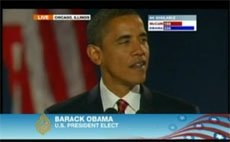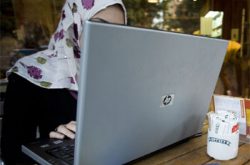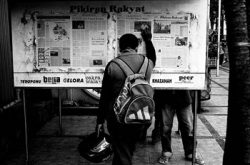Hamid Dabashi gives “blood and bone” to the lives and predicaments of Iran’s filmmakers. Yet his conceptions of “realism” seem to be surrogates for aesthetic judgments, argues Farouk Mitha.
Read More »Nasrallah and the compromise and rehabilitation of Hizbullah’s reputation
A pitched battle on the streets of Beirut backed Hizbullah’s opponents into a corner last May. But it was media savvy and the powerful rhetoric of Hassan Nasrallah that turned a tactical victory into a strategic success, argues David Wilmsen. Features video and full translations of three speeches.
Read More »BOOK REVIEW | Desiring Arabs
Massad’s work on Arab sexuality in literature and media in reference to Said’s Orientalism will no doubt promote fruitful discussions, says Stephanie Tara Schwartz.
Read More »Social media and the Gaza conflict
More than ever before, governments and pressure groups sought to use social media like Facebook and YouTube to rally support during the Gaza conflict. Why did so many of these attempts fizzle? Managing Editor Will Ward investigates.
Read More »BBC Arabic TV: A “unique experience” says Hosam El Sokkari
Hosam El Sokkari, the man behind the BBC's move into Arabic-language television, insists the new channel will not be the British Alhurra. So why would the British public want to spend Foreign Office money on a channel in the Arab world? Co-Editor Lawrence Pintak finds out.
Read More »Al Jazeera English election coverage: Another missed opportunity
Al Jazeera English’s election night coverage had the feel of a local college TV station, marking another missed opportunity for the channel that has yet to live up to its potential to produce true borderless journalism, writes Publisher and Co-Editor Lawrence Pintak.
Read More »Core to Commonplace: The evolution of Egypt’s blogosphere
A vanguard of techies and activists used blogs to change the face of politics and journalism in Egypt. But once a small town, Egypt’s blogosphere now resembles a sprawling metropolis with a less clearly defined center, argues Courtney C. Radsch.
Read More »Lessons worth learning: The Indonesian model
Over the last two decades an explosion of new private outlets has dramatically changed Indonesia’s media landscape, writes Publisher and Co-Editor Lawrence Pintak. What lessons does this hold for the Arab press?
Read More »The voice of a commander and statesman: Bashir Gemayel
Contributing Editor Pete Ajemian traces the rhetoric and media techniques of Bashir Gemayel from his years as a military commander to the days before his assassination as president-elect of Lebanon. Featuring video and full English translations.
Read More »Politics and priorities: Inside the Egyptian press
Pulitzer Prize-winning journalist Kenneth J. Cooper gets behind the headlines at three Egyptian dailies, looking at the politics and ideologies that drive coverage choices.
Read More » Arab Media & Society The Arab Media Hub
Arab Media & Society The Arab Media Hub










